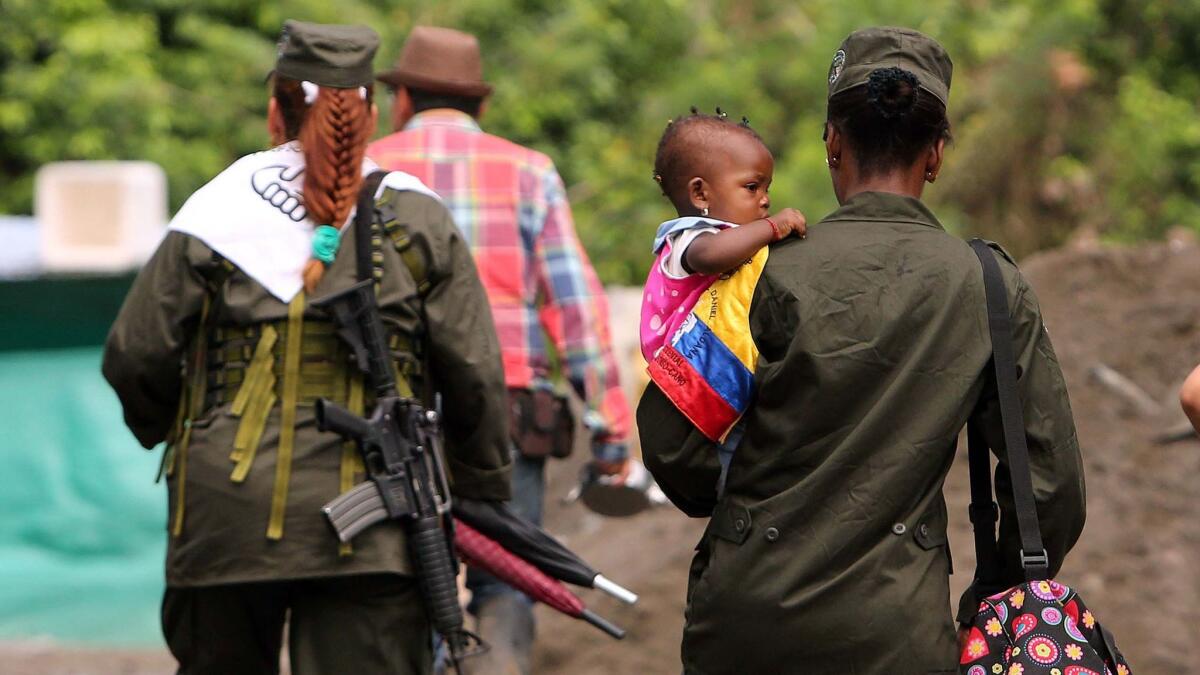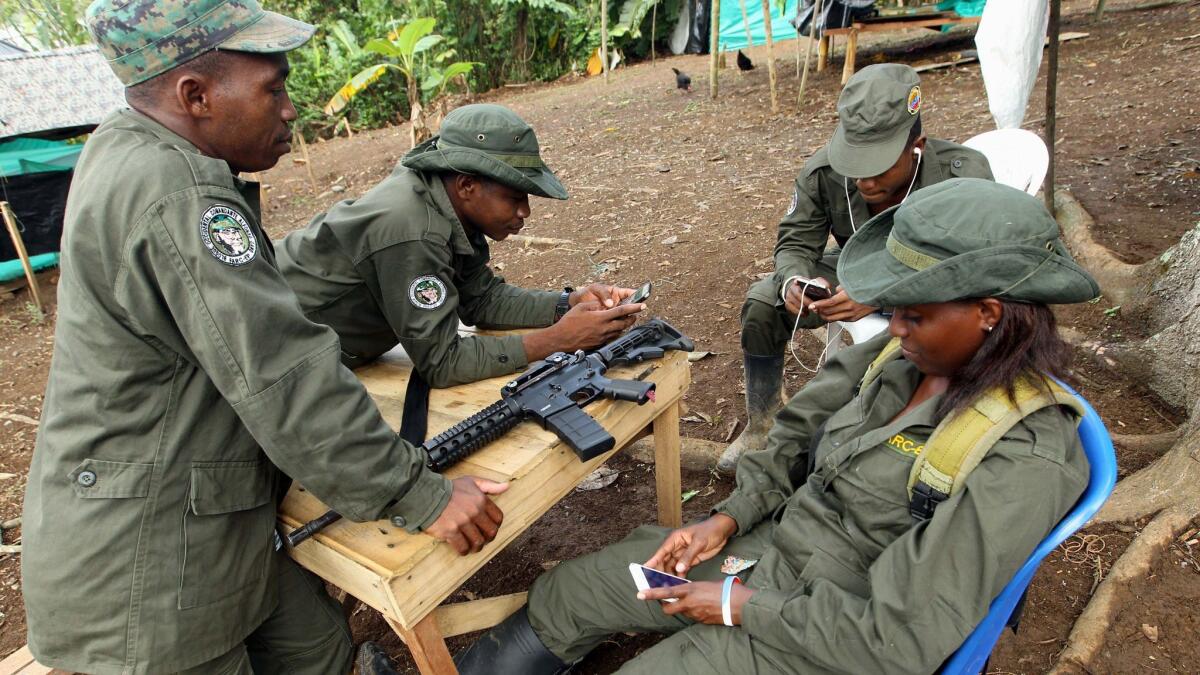Colombia has a peace deal, but can it be implemented?

Reporting from Bogota, Colombia — The euphoria that followed the historic peace deal signed by the Colombian government and FARC rebels is giving way to the sobering realities surrounding its implementation. Some analysts fear the financial, political and security challenges may be too much for the Colombian government to handle.
More than 7,000 rebels are in the process of giving up their arms under U.N. supervision in 26 “transitory normalization zones” in rural areas scattered around the country. The rebels began relocating to the temporary encampments after congress approved the accord in December, ending 52 years of conflict.
But complaints emerged last week, with both sides accusing the other of noncompliance. Former FARC leader Ivan Marquez said the government has not followed through on promises of food, clothing, money or housing. In many cases, the government failed to build the tent cities in time for the rebels’ arrival from their jungle and mountain hideouts, he said.
For its part, the government blamed the FARC for being too slow to turn over arms and explosives, for making demands not included in the deal signed in Havana after four years of negotiations and for restricting access of construction workers to the encampments.
The peace deal calls for the FARC to abandon the transitional zones and blend into society after the disarming is finished in June. But in an extraordinary letter sent recently to President Juan Manuel Santos, more than two dozen former armed services commanders, all retired generals and admirals, said they were concerned that FARC will convert the transitional camps into permanent “independent republics.”
Although defense minister Luis Carlos Villegas dismissed the former commanders’ concerns as based on “disinformation,” the letter was a remarkable display of the opposition many in Colombian society feel toward the peace deal and the distrust they have for the rebels.
The complaints come at a time when the Santos government remains highly unpopular and as many of his ministers are leaving the government to begin their campaigns for next year’s presidential and legislative elections. Political disarray is one of the “enormous difficulties ahead,” said Alejandro Reyes, expert in agricultural policy who was part of the government negotiating team in Havana.
“A big reason for my pessimism is the timing. Santos’ government is very discredited with less than 30% approval rating, and the political coalition he built to pass the peace deal is weakening in advance of the 2018 presidential election,” Reyes said.
Other concerns revolve around financing the peace. In exchange for the rebels’ agreeing to lay down their weapons, the government promised billions of dollars in aid and education, land reform, rural infrastructure and guaranteed political representation over the next decade. Santos also committed to protecting the rebels from reprisals by right-wing paramilitary groups.

The cost of providing that aid to the rebels and rural farmers has been conservatively estimated at $4 billion per year over the next decade, or roughly 5% of the annual budget, said Adam Isacson, a Colombia policy expert at the Washington Office on Latin America think tank. That’s a big bill for a country running fiscal deficits and suffering from price declines in principal exports crude oil and coal, he said.
“Colombia is in a hole and doesn’t have a way of getting out of that hole,” Isacson said. “Colombia’s rural conflict zones need a Marshall Plan right now, but at least for the next couple of years, they’ll be lucky to avoid an austerity plan.”
Colombia was counting on financial help from the United States, which has given the country more than $10 billion in mainly military and anti-drug aid since 2000 under the so-called Plan Colombia. The aid is largely credited with saving Colombia from an armed FARC takeover.
After the peace deal was signed last year, President Obama promised Santos $450 million in aid for next fiscal year, up from $320 million this year. But that amount is now in doubt. President Trump has said he may cut foreign aid across the board and so far has not said publicly whether Colombian peace will be a priority.
Santos’ political strength, which he will need to persuade congress to fund his rural development plans, is also in doubt. In an October plebiscite, a majority of voters rejected the peace deal as too favorable for the rebels.
Santos, who received the Nobel Peace Prize for his role in the peace agreement, later turned to congress to approve the peace deal so as not to risk another setback at the polls, a move that rankled many Colombians.
Former President Alvaro Uribe, now a senator and major political player, leads politicians opposed to the peace deal. If the candidate from his Democratic Center Party wins next year’s presidential vote, he or she may try to scrap the peace deal altogether. (The constitution bars Uribe from running for another term.)
Among the many peace accord features Uribe opposes is the government plan to pay rebels a monthly stipend of about $600 through 2018, as well as grants of up to $7,000 each to start a small business.
Financial assistance is crucial because Colombia’s economy is growing slowly, and the private sector has been reluctant to hire former fighters.
“The absorption of ex-rebels into society has been described in rosy rhetoric but Colombian entrepreneurs have told me they shy away from former combatants and look for other people to hire,” said Bruce Bagley, international relations professor at the University of Miami. “They don’t trust the FARC. Many consider them monsters who have committed atrocities.”
Another question mark is whether the government will be able to protect demobilized FARC rebels once they reenter society and begin participating in the political process.
“For the first six months of the peace process, the guerrillas are supposed to be protected by the military. But it’s not clear the military is capable of doing it,” Bagley said.
Over the past year, at least 74 community leaders have been murdered — and many suspect right-wing death squads are responsible. The deaths are a reminder of the more than 1,000 leftist politicians, usually sympathetic to the FARC, who were systematically killed after a peace deal was signed with rebels in the 1980s.
A cornerstone of the peace deal is agrarian reform, including the government’s promise to return land to property owners who were forced by land grabbers — various armed groups, including the FARC and drug traffickers -- to sell it or flee for their lives during two decades of conflict. Santos has also promised to build roads and other infrastructure in rural areas.
Researcher Reyes said carrying out those ambitious plans is a tall order for the government because as much as one third of the 15 million acres in question is now controlled by violent drug traffickers and other criminal groups.
“Many narcos and mafiosos have tried to seem legitimate by becoming huge landowners, mainly for cattle ranches,” said Reyes. “You can be sure they will react against any efforts to implement agrarian reform.”
Isacson, of WOLA, said he is concerned for the fate of the peace accord because the Colombian government so far has shown a “lack of managerial or technical capacity to keep all these promises.”
“A key example is that it’s taken months to build tents on patches of dirt to house the rebels. The government couldn’t prepare these zones and get food there and some of these transitional camps aren’t that remote ,” Isacson said. “So I’m worried about the process.”
Kraul is a special correspondent.
ALSO
Amid U.S.-Mexico acrimony, energy might present common ground and opportunity, analysts say
Brazil goes a little less wild for this year’s Carnival
Bone by bone, Iraqis unearth a mass grave: ‘We will be out there digging until no one is left’
More to Read
Sign up for Essential California
The most important California stories and recommendations in your inbox every morning.
You may occasionally receive promotional content from the Los Angeles Times.










